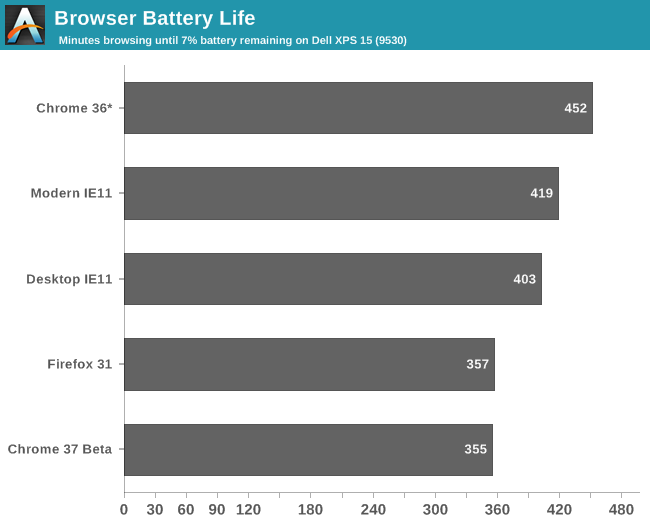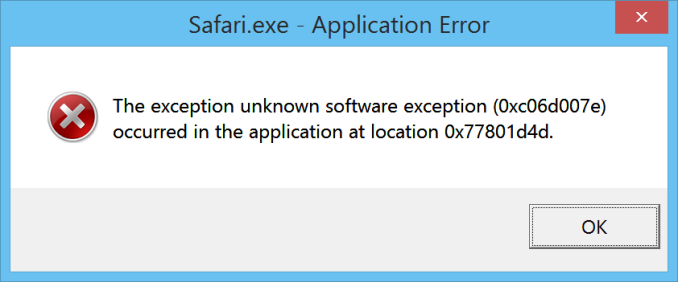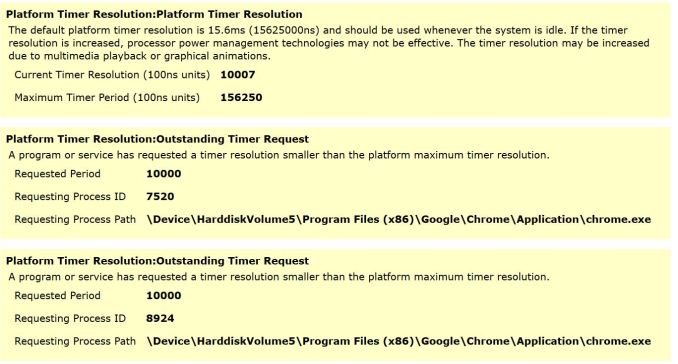Browser Face-Off: Battery Life Explored 2014
by Stephen Barrett on August 12, 2014 6:00 AM ESTResults and Analysis
There is a lot to talk about with these results. While Google Chrome's 1ms timer request certainly uses more power than otherwise, everything else about Google Chrome seems to make up the difference -- at least for Chrome 36. Unfortunately, Chrome 37 takes a dive of almost 25% placing it roughly tied for last place with Firefox. Considering Chrome 36 and Safari are the only browsers on our list that do not support HiDPI displays, that could be the difference. I have added an asterisk on the chart to indicate Chrome 36 is not quite doing the same work as the other browsers. There seems to be a significant battery penalty when natively rendering at 3200x1800 instead of 1600x900 and then scaling up via Windows.

It would be interesting to repeat this test on a lower resolution display, but that would be largely academic, as many laptops today ship with HiDPI displays and more are always on the way. To be honest, I'm not sure anyone could actually use Chrome 36 on a HiDPI display without going crazy anyway, so the fact that Chrome 36 leads the pack here is probably irrelevant.
Update: Chrome has been tested at 1600x900
Just to confirm, I did run a powercfg /energy report and Google Chrome was indeed requesting the high resolution timer.
Energy report while Google Chrome was browsing our test web sites
A few of our test websites also contain flash advertisements, so I was curious if these also caused Firefox and IE11 to increase their timers. Running the same powercfg /energy report did not show any timer increase for those browsers.
Energy report while Firefox or IE11 were browsing our test web sites
As for Safari, unfortunately the browser was having all kinds of trouble being automated by our test suite. The browser window would lose focus every ten seconds and result in lost keyboard inputs. Looking into task manager, whenever Safari would lose focus "Windows Error Reporting" would appear in the processes list. After disabling the Windows Error Reporting Service, Safari instead threw unhandled exceptions every 10 seconds.

Tough to automate a program that throws errors every 10 seconds...
Apple's website does not list any known issues regarding this error. Disabling display scaling, running at 1600x900 resolution, and reinstalling Safari did not resolve the issue. Considering Safari for Windows is still on version 5.1.7 from over two years ago and apparently won't be receiving any further updates, we decided it was best to simply exclude the browser from any further testing.












112 Comments
View All Comments
Way69 - Tuesday, August 12, 2014 - link
I seriously question the validity of even including Safari in this test. Safari for windows hasn't been updated since 2012.Either exclude safari or actually test the OS X version (at least that would make for an interesting read).
manuroc - Tuesday, August 12, 2014 - link
And why on earth exclude a modern browser like Opera while keeping outdated Safari.In addition, since there is a curious performance degradation across Chrome versions, why not test dev version 38?
JarredWalton - Tuesday, August 12, 2014 - link
Stephen originally tried testing Safari, and felt the issues were at least worth mentioning. We forgot to remove the "non-result" from the chart but that is now fixed.As for Opera, it's something to look at in a future update, but that will require additional testing/scripting to get working properly. The major browsers are IE, Firefox, Chrome, and Safari (admittedly, it's really only for OS X and iOS), so that's where we started.
SanX - Wednesday, August 13, 2014 - link
I'd support in future testing Opera for PC ver. 12 maximum but not touching yet newer Opera ver. 20+ which is just in development and so is a total messOpera for ARM mobiles is very good by the way, I keep 20 tabs ON all the time and see literally zero consumption
sluflyer06 - Tuesday, August 12, 2014 - link
The answer to that probably lies within the fact that Opera is a statistically insignificant browser. Their market share is down to .87% in the desktop/laptop scene.Stuka87 - Tuesday, August 12, 2014 - link
You do realize that 1% of the worlds internet users is 28 million people right? While the percentage may seem small, it is far from insignificant.Bob Todd - Tuesday, August 12, 2014 - link
It is insignificant to anyone that writes software for the web. Even large multi-billion dollar companies often do not bother to test _any_ version of Opera with their web applications. Same logic applies for someone spending time scripting battery life tests. Do you want to add another 20% to your time/effort to get this working for something that less than 1% of your readership cares about (even if browser stats for Anandtech have a higher slant toward Opera than the rest of the averaged web, it will still be far below the others).easp - Tuesday, August 12, 2014 - link
On the other hand, *if* Opera was significantly better than others at something as significant as power efficiency, it would be rather unfortunate if a site like Anandtech didn't highlight that fact.soccerballtux - Wednesday, August 13, 2014 - link
thats a good pointsluflyer06 - Wednesday, August 13, 2014 - link
*if* it was much better than it is, then naturally the market share would increase and it would be statistically significant to cover in the first place.